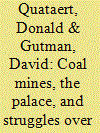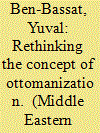|
|
|
Sort Order |
|
|
|
Items / Page
|
|
|
|
|
|
|
| Srl | Item |
| 1 |
ID:
113392


|
|
|
|
|
| Publication |
2012.
|
| Summary/Abstract |
This article is based on a case file examining the allegedly corrupt behavior of the district governor (kaymakam) of Eregli, located in the Black Sea coal district of the Ottoman Empire, before the 1908 Young Turk Revolution. It paints a vivid picture of the cronyism, greed, and demands for justice that abound in the testimonies and petitions of a diverse array of local actors that were included in the case file. These documents provide the opportunity to shed light on, among other things, the growing nexus between state power and capital in the late Ottoman Empire within a little-studied peripheral context. As the article shows, prospects of control over the region's burgeoning coal economy led to abuses among officials at various levels of the local and imperial bureaucracy, the impacts of which were felt (to varying degrees) by a wide cross-section of Eregli society. The behavior of the district governor and his allies, along with the final decision made in the case, reveals much about power, wealth, and justice in the final years of the Abdülhamit regime.
|
|
|
|
|
|
|
|
|
|
|
|
|
|
|
|
| 2 |
ID:
089121


|
|
|
|
|
| Publication |
2009.
|
| Summary/Abstract |
An examination of the diverse Hebrew newspapers published in Palestine in the aftermath of the Young Turk Revolution of 1908 teaches us a great deal about the complexity of the term Ottomanism, which was interpreted differently by the Empire and the minorities remaining within its shrinking borders. Whereas the Empire officially perceived Ottomanism as a new form of hybrid identity which would substitute existing national identities, the yishuv's various sectors envisioned a decentralized empire under the house of Osman. In this sense, the Revolution encouraged the emergence of a shared national vision among many circles in the yishuv, although each group still strove to shape the character of the Zionist community in Palestine according to its own agenda.
|
|
|
|
|
|
|
|
|
|
|
|
|
|
|
|
| 3 |
ID:
120847


|
|
|
|
|
| Publication |
2013.
|
| Summary/Abstract |
The central Ottoman archives in Istanbul provide a unique bottom-up perspective on the early Zionist-Arab encounters in Palestine at the end of the nineteenth and early twentieth centuries and the interactions between the rural population and the first Zionist colonists. This perspective is somewhat different from the customary outlook in the literature on early Arab reactions to Zionist activity which has primarily focused on the reactions of the educated urban elites in the aftermath of the Young Turk revolution of 1908. This study discusses five petitions sent by the rural population of Palestine, both villagers and Bedouins, against Jewish activity and its impact on them. The petitions by these understudied subaltern groups reveal the complexities of the encounters between the two populations prior to the development of the political struggle in Palestine, and add a new dimension to the more familiar viewpoint provided by Zionist and European sources. This article thus seeks to examine the extent to which the revolution, which is commonly considered a watershed for the start of the Jewish-Arab political struggle, is reflected in these petitions. It also inquires whether there was a change of tone in the petitions following the revolution and, if so, what can be learned from them regarding the nature of Jewish-Arab relationships at the time.
|
|
|
|
|
|
|
|
|
|
|
|
|
|
|
|
|
|
|
|
|